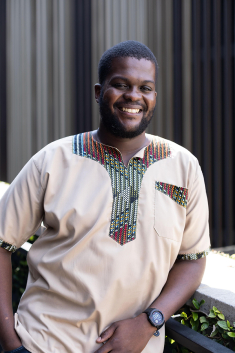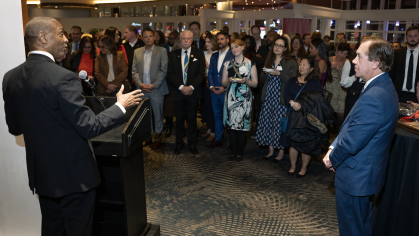Alumnus Teamed Up With Rutgers Faculty to Ensure AI Is Accessible To All

From an early age, Vukosi Marivate was fascinated with machine learning, the idea of using existing data and algorithms to teach computers to be more accurate and better predictors of human behavior.
After receiving his doctoral degree in computer science from Rutgers University in 2015, Marivate has risen to become a global leader in teaching machines to process languages, particularly those spoken in Africa.
Now as chair of data science at University of Pretoria, South Africa he is teaming up with Critical AI @ Rutgers, an interdisciplinary initiative that aims to deepen the understanding of the emerging technology to make sure no culture is left out of the AI revolution. This effort includes hosting a two-week institute called Design Justice AI in Marivate’s home country this summer. The conference aims to delve into and critique current AI design principles, employing the Design Justice lens to gather young researchers. It will facilitate sharing and collaborative research focused on human-centered AI.
“This revolution is coming or is already here and we want to make sure that Africans benefit,” Marivate said. “If you don't take care to have an opportunity to have your voice heard during these big changes, everything happens to you, not with you. You have less control of your future. And this has already happened to many communities around the world with previous revolutions, so we can't have it happen again.”
Marivate has been working on addressing AI’s ability to process different languages since he returned to South Africa. After completing his degree from Rutgers, he and others in his field realized that AI was moving fast globally, and Africans had to move faster before the continent was left behind. They also realized they couldn’t wait around for others to assist them.
“We didn't see the gap was going to be filled by any of those constituents, whether it's government, the private sector, or academia,” Marivate said. “What you need is to have more people doing AI.”
From that idea, the Deep Learning Indaba, an AI grassroots movement, was born, which encourages anyone – from students and professors to computer scientists and investors – to contribute to the advancement of AI in Africa.
There are 1.4 billion people living on the African continent, with the population expected to nearly double by 2050 reaching 2.5 billion, according to United Nations projections. About 2,000 native languages are spoken across 54 African countries, said Marivate, adding that there are 12 official languages in South Africa alone.
“Sure, you could have a chat in GPT or Google Gemini, but all of those are just interacting in English and they are erasing all of the identity that Africa has,” Marivate said.
Computer scientists refer to using machine learning to teach computers to break down and interpret human languages as Natural Language Processing. This technology is used by chatbots, voice-assisted search engines or translation software.
These models tend to rely on the internet to extrapolate or “scrape” data for the design of their programs, Matthew Stone, professor and chair of computer science at Rutgers, said during a symposium last year. But these programs rely on data that’s available in only a handful of languages: English, Chinese or Spanish, said Stone, who is one of the Rutgers faculty collaborating with Marivate for the institute in South Africa.
Aside from his personal connection to Rutgers, Marivate said the university was a good partner because its scholars have been researching AI’s impact on the humanities and social sciences since at least 2018 when Critical AI @ Rutgers was formed.
“What could be lost from human creativity and diversity if writers or visual artists anywhere in the world came to rely on predictive models that excluded the majority of the world’s many cultures and languages?” asked Lauren M. E. Goodlad, distinguished professor of English and comparative literature and chair of Critical AI @ Rutgers initiative.
Design Justice AI will run from June 30-July 13 at University of Pretoria and in collaboration with Rutgers Center for Cultural Analysis, which oversees Critical AI @ Rutgers. The Humanities Institute at University of Connecticut and Humanities Research Centre at Australia National University are also involved in the two-week event.
In the fall, the organizers will hold a follow-up meeting that will likely take place at Rutgers.
In addition to workshops and lectures, the July institute will feature a two-day public event called “Discotech” that brings in students and local community members to participate. The public will join in translation; resourcing of local language data; multi-media art, music, and performative projects; and the training of new language models.
“We can start our own movements,” Marivate said. “We can teach each other. We can do the research together. Through that, we can then change the status quo. It's from the grassroots, it's from the people who want to be the ones who'd make the change, who want to be the ones who build the technologies coming together through initiatives.”


